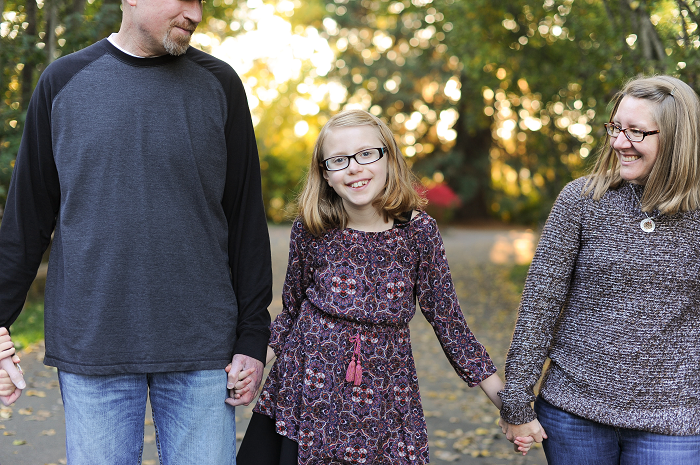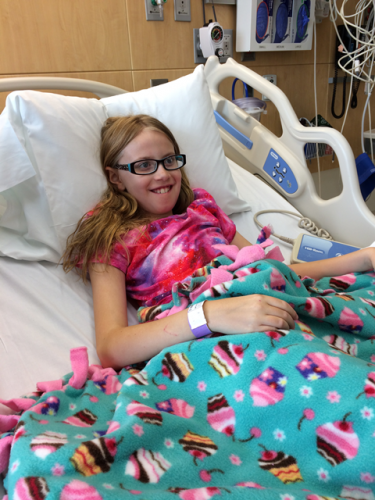
Creativity is at the center of 11-year-old Carson Bryant’s life.
“I would describe her as being imaginative,” her mother, Andrea Bryant, said. “She has a love for theater and dreams of being an illustrator someday.”
In January 2018, Carson had to put her creative passions aside when she began experiencing symptoms that sparked concern for her mother.
“I noticed Carson was making frequent trips to the bathroom,” she said. “I became even more worried when there was blood in her stool.”
Bryant took her daughter to see a doctor in their hometown of Gig Harbor, Washington; a city located more than 40 miles southwest of Seattle.
“After preliminary tests were done, we were recommended that she see a specialist,” Bryant said. “We were given two options and we chose Seattle Children’s because of the great experiences we’ve had with our son there.”
Getting answers
 During Carson’s first visit to Seattle Children’s, she was seen by a provider in the Gastroenterology and Hepatology clinic.
During Carson’s first visit to Seattle Children’s, she was seen by a provider in the Gastroenterology and Hepatology clinic.
“We were told that Carson needed a colonoscopy so they could get a better look into the cause of her symptoms,” Bryant said.
“During a colonoscopy, we use a scope, which is a long, thin, flexible tube with a tiny camera and light on the end that is inserted into the digestive tract,” said Dr. Namita Singh, Seattle Children’s gastroenterologist. “The scope shows us the inside of the gastrointestinal tract and we are able to detect any abnormalities.”
The exam confirmed that Carson had inflammatory bowel disease, or IBD.
“Patients with IBD experience an overactive immune response in which the digestive tract becomes inflamed and causes damage,” Singh said. “Crohn’s disease and ulcerative colitis are two forms of IBD. They are both chronic conditions, and while alike in some ways, they also have significant differences.”
Carson was diagnosed with Crohn’s disease, which causes swelling and inflammation in the wall of the digestive tract. Both the mucosa, or intestinal lining, and the deeper layers of the wall become inflamed. Over time, this can damage the tissue and cause sores or ulcers.
“It was good to get answers about the cause of Carson’s issues,” Bryant said, “but we noticed that during the examination process, she was getting sicker and sicker.”
When Carson met with Singh for the first time for an examination follow-up, her health was at the lowest of lows.
“She was going to the bathroom at least 20 times a day and looked horribly sick, which was extremely worrisome,” Bryant said. “With Carson’s condition worsening, she needed to be admitted to the hospital to receive treatment.”
When Carson learned she had to stay at the hospital, she burst into tears.
“She was so upset and scared,” Bryant said, “but once we got there, she was approached by one of their therapy dogs and that seemed to put her at ease.”
Care just around the corner
 After a couple of days in the hospital, Carson’s health improved.
After a couple of days in the hospital, Carson’s health improved.
“It turned out she was very dehydrated,” Bryant said. “She was put on IV fluids and a different medication that is used when other therapies haven’t worked.”
Carson was released from the hospital just in time to prepare for the new school year.
Knowing Carson would need regular clinic appointments to manage her Crohn’s disease, Bryant felt fortunate that there was another option available that would save them the stress of driving several hours to Seattle Children’s hospital campus.
“We have been able to schedule all of her appointments at Seattle Children’s South Clinic in Federal Way,” Bryant said. “This is a huge deal for us, as it has lessened our travel time allowing for Carson to not miss much of her school day.”
Singh is the director of the IBD Center at Seattle Children’s South, which has made it all the more convenient for Carson to see her.
The South clinic also offers Infusion Services, which is needed for Carson’s treatment. Through regular scheduled infusions, Carson can receive the medication she needs through an IV.
“Infusions typically take three hours,” Bryant said. “Conveniently, we can coordinate with Dr. Singh’s schedule so she can see Carson during her infusion.”
Helping kids closer to home
 While Carson continues to receive ongoing treatment, she’s now back to pursuing her creative passions as a much stronger and happier young girl.
While Carson continues to receive ongoing treatment, she’s now back to pursuing her creative passions as a much stronger and happier young girl.
“This experience has given Carson a new perspective,” Bryant said. “She’s faced her fears, like getting poked with a needle, and is more at ease with everything.”
The South clinic IBD Center continues to grow their multidisciplinary team, which includes nurses, dietitians, social work, infusion and imaging labs. Singh is optimistic that they’ll be able to help even more children like Carson affected by IBD now that families living in the region are able to receive the services they need much easier.
“Carson is an example of how the South clinic has given families a way to receive the treatment their child needs closer to home,” Singh said. “It’s rewarding to see patients like Carson thrive because they are able to get the help they need.”
Bryant is grateful to Singh and her team for offering the services on the South end to manage Carson’s health.
“Dr. Singh gives Carson so much encouragement, which I really appreciate,” Bryant said. “Seattle Children’s made an experience that could be extremely scary and difficult, to one that was comfortable and less stressful.”
Resources:
- Seattle Children’s South Clinic in Federal Way
- Inflammatory Bowel Disease Center
- Seattle Children’s Gastroenterology and Hepatology

